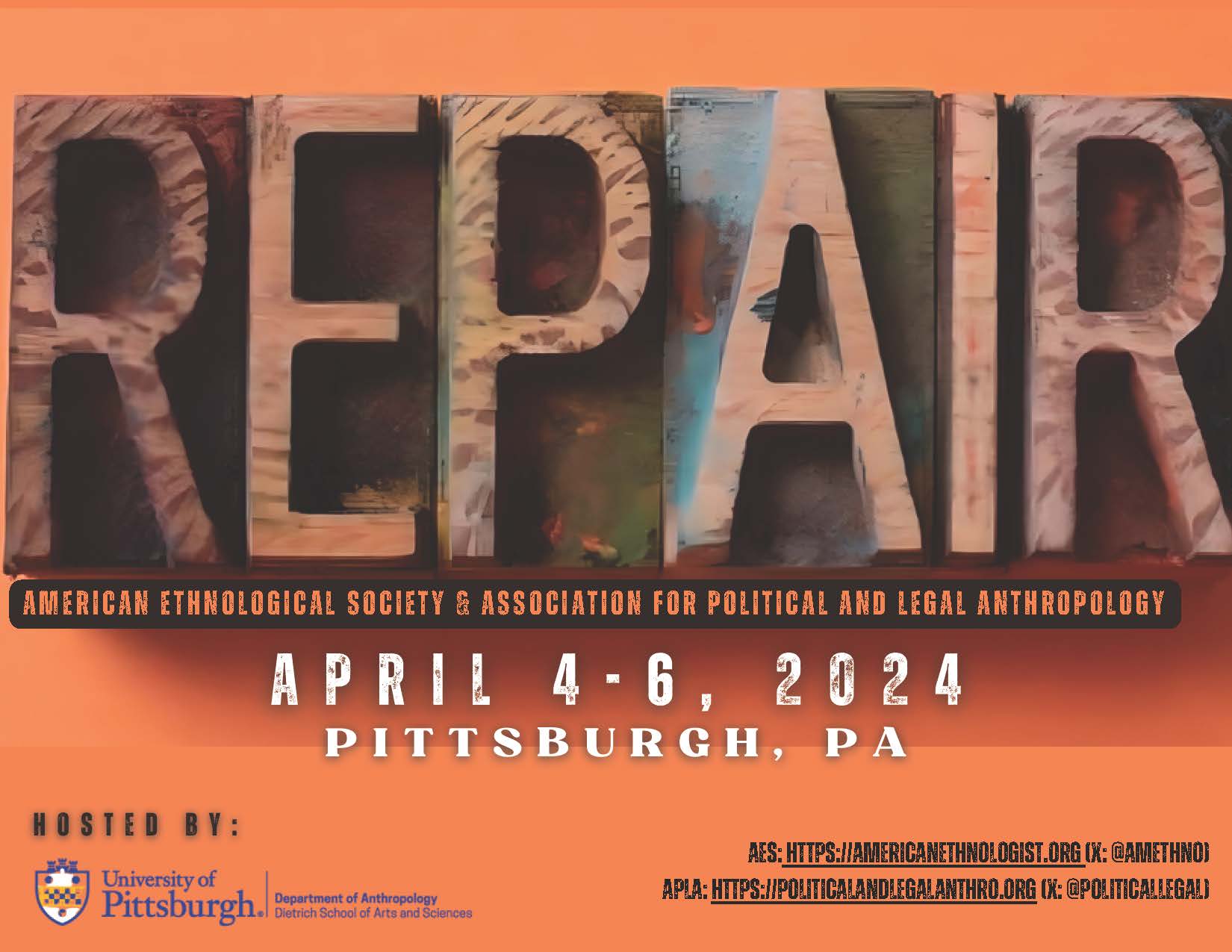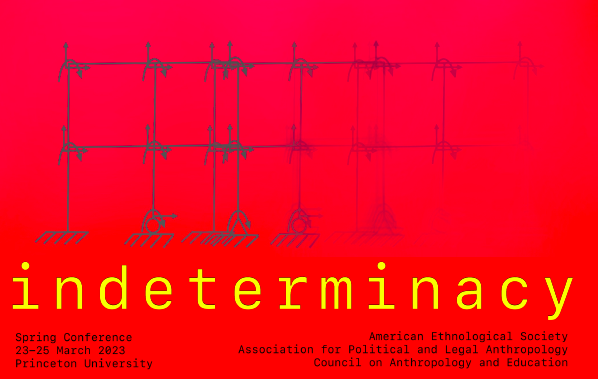March 31 – April 2, 2016
Washington D.C.

Incoherence: Disorder, Normativity, Anthropology
Anthropology is about assembling worlds. Despite that impulse to order, much of cultural anthropology today reveals the disorderly, messy, and unstable social terrains upon which our research often unfolds. Precarity, insecurity, disorder and uncertainty are common themes in recent theorizing on intersubjectivity and sexuality, politics, economics and culture on every scale — personal, local, national, transnational and global. Matters of war, conflict, violence, and abuse remain the objects of anthropological attention, joined by concerns with the decay, mutation, or failure of institutions, formations, processes, and beliefs that once seemed constant and reliable.
Studies of migration and mobility, like other work in the anthropology of globalization and transnationalism, point to the importance of movement and change in contemporary contexts, against the kinds of ordered stability that preoccupy the imaginations and memories of states and their agents, as they often do the practitioners of other academic disciplines. Meanwhile, anthropological studies of borders, of legal ordering, of sexuality and queer identity, of infrastructure, personhood, citizenship, and alienation force us to consider the ways in which older ways of making order fight to maintain relevance in a changing world.
The anthropology of medicine and health, of language, of science and technology, of religion and the family – all reveal the many ways in which a lack of normative consistency characterizes human behavior, social interaction, and cultural production. What if incoherence, rather than order and completeness, better characterizes contemporary social life? Papers and panels are invited for a conference that concerns itself with incoherence, however conceived – as instability, contingency, transition, incompleteness, inconsistency, chaos, or in other ways. Work that plays with normative conventions of anthropological expression – that is itself incoherent, while still being insightful – is especially welcome.
The 2016 AES spring conference will be held in Washington, D.C., March 31-April 2, 2016 at the Liaison Capitol Hill, a short walk from Union Station.
Organizer: Daniel M. Goldstein (Rutgers University)
New Panelist added for this Thursday night’s reception and book event at the Busboys and Poets bookstore on “Homeland Insecurity: Anthropologists Discuss Terror, Corruption, and Displacement.” Come hear Susan Terrio (Georgetown U), author of Whose Child am I? Unaccompanied, Undocumented Children in U.S. Immigration Custody. Susan joins Catherine Besteman, Joseph Masco, and Janine Wedel, and moderator Deborah Thomas.
Workshops for Graduate Students
The AES Spring 2016 conference will host four workshops for graduate students. Enrollment will be capped, so participants are encouraged to sign up as soon as possible.
- Four-Field Anthropology: Jobs, Publishing, and Future Prospects of the Discipline
Host: Jason de Léon, Assistant Professor of Anthropology, University of Michigan Thursday, March 31, 2:00-4:00 PM Cap: 6
In this open conversation, participants will discuss the current state of holism in anthropology and the realities of trying to cross sub-disciplinary boundaries in field work, publications, and the job market with Jason De León, the Director of the Undocumented Migration Project and author of The Land of Open Graves: Living and Dying on the Migrant Trail. - Finding Your Voice: On Clarity and Confidence in Ethnographic Writing
Host: Carole McGranahan, Professor of Anthropology, University of Colorado Thursday, March 31, 2:00-4:00 PM Cap:10
Anthropologists are writers, and yet, what sort of writers are we? What sort of writers should we be? In this workshop, we will explore the process of writing in anthropology through the concept of one’s writing voice. Having clarity and confidence in one’s writing is not just a matter of knowing what you want to say, but also knowing your material, knowing that you have stories to share and arguments to make that matter. Whether it is sinking into ethnographic detail or theoretical argument, the development of one’s writing voice involves trust that ideas are generated during the writing process itself. Writing is not just the instrumental conveying of ideas, but the creative generation and development of them. As such, one’s writing voice is a part of one’s ethnographic sensibility, one’s ethnographic sense of people and the world and relationships and struggles and stories and more. Part of our work will include asking questions such as: When do you feel most confident as a writer? How has your writing changed over time? What writing inspires you? Following from these questions, and our collective discussion of ethnographic writing, participants will share their writing as well as engage in hands-on practices designed to illuminate and strengthen one’s own writing voice. - Getting your Article Published
Host: Niko Besnier, Professor of Cultural Anthropology, Universiteit van Amsterdam Editor-in-Chief, American Ethnologist Thursday, March 31, 2:00-4:00 PM Cap: 10
For many scholars who are getting started in their academic careers, how to get an article published is fraught with mystery and anxiety-provoking. This workshop aims to dispel some of the mystery and alleviate some of the anxiety. Focusing in particular on our journal American Ethnologist, we will analyze argument structure, the relationship between theory and ethnography, issues of voice, and the practical aspects of writing and submitting an article manuscript that will sail through the review process.americanethnologist.org - Grant Writing and Grant Funding at the NSF
Host: Jeffrey W. Mantz, Program Director, Cultural Anthropology Program, NSF Saturday, April 2, 2:00-4:00 PM Cap: 10
In this workshop, participants will receive instruction in preparing grant proposals for dissertation and postdoctoral field research, with a special emphasis on applying to the National Science Foundation. Grant funding opportunities for cultural anthropologists at the NSF will also be covered. Beginning and experienced grant seekers will benefit greatly from this session.
Keynote Speakers
Thursday: Jason de Léon (University of Michigan)
“Total Chaos, Extreme Boredom, and Everyday Violence: The (In)Coherence of a Four-Field Approach to Undocumented Migration”
The social process of undocumented Latino migration is often characterized as either routinized or haphazard, a dichotomy that tends to privilege either macroscale analysis devoid of ethnographic nuance or first person narratives that overemphasize the noble suffering of border crossers. In this talk I argue that much can be learned about clandestine migration from Latin America to the United States through a four-field approach. However, the new insights that arise from this holistic endeavor also challenge pre-conceived notions about migration and what it means to be a “migrant”, undermine our analytical and theoretical ability to bring satisfactory order to this social process, and illustrate the difficulty and contradictions of practicing a four-field anthropology in the 21st century.
Jason de Léon is an assistant professor of anthropology and Latino/a Studies at University of Michigan. His research interests include theories of violence, materiality, death and mourning, Latin American migration, crime and forensic analyses, and archaeology of the contemporary. He directs the Undocumented Migration Project, a long-term study of clandestine border crossing that uses a combination of ethnographic, archaeological, and forensic approaches to understand this phenomenon in a variety of geographic contexts including the Sonoran Desert of Southern Arizona, Northern Mexican border towns, and the southern Mexico/Guatemala border. He is also developing a large-scale project on urban violence, Latinos, and crime scene analysis.
Friday: Lily King
“Inside the Author’s Workshop,” Interview with author of Euphoria, a novel exploring the love triangle among three anthropologists in the 1930s, including Margaret Mead.
Lily King’s first novel, The Pleasing Hour (1999) won the Barnes and Noble Discover Award and was a New York Times Notable Book and an alternate for the PEN/Hemingway Award. Her second, The English Teacher, was a Publishers Weekly Top Ten Book of the Year, a Chicago Tribune Best Book of the Year, and the winner of the Maine Fiction Award. Her third novel, Father of the Rain (2010), was a New York Times Editors Choice, a Publishers Weekly Best Novel of the Year and winner of both the New England Book Award for Fiction and the Maine Fiction Award. It was translated into various languages. Lily’s latest novel, Euphoria, was released in June 2014. It won the Kirkus Award for Fiction 2014, the New England Book Award for Fiction 2014 and was a finalist in the National Book Critics Circle Awards. Euphoria was named one of the 10 Best Books of 2014 by The New York Times Book Review. It was included in TIME‘s Top 10 Fiction Books of 2014 and the Amazon Best Books of 2014. Reviewed on the cover of The New York Times Book Review, Emily Eakin called Euphoria, “a taut, witty, fiercely intelligent tale of competing egos and desires in a landscape of exotic menace.” The novel is being translated into numerous languages and a feature film is underway. Lily is the recipient of a MacDowell Fellowship and a Whiting Writer’s Award. Her short fiction, essays, and reviews have appeared in many publications, including The New York Times, The Washington Post, The Los Angeles Review of Books, Ploughshares, Glimmer Train, and several anthologies. Lily King grew up in Massachusetts and received her B.A. in English Literature from University of North Carolina at Chapel Hill, and her M.A. in Creative Writing from Syracuse University. She has taught English and Creative Writing at several universities and high schools in this country and abroad. lilykingbooks.com
Saturday: Tanya Luhrmann (Stanford University)
Keynote Address: “Invisibilia: How Thinking about Thinking Shapes the Immaterial”
Our experiences of the supernatural and the psychotic often seem incoherent, spontaneous, forced upon us by an unpredictable world. But our willingness to recognize them has a lot to do with how we think about our thoughts and impressions. I argue in this talk that the way we think about thinking—what we could call our local theory of mind—shapes what we recognize and how we respond to it—but only in part.
Tanya Marie Luhrmann is the Watkins University Professor in the Stanford University Anthropology Department and is a contributing opinion writer for the New York Times. Her books include Persuasions of the Witch’s Craft, (Harvard, 1989); The Good Parsi (Harvard 1996); Of Two Minds (Knopf 2000) and When God Talks Back (Knopf 2012). She received her Ph.D. the University of Cambridge, and taught at the University of California, San Diego, and then at the University of Chicago before arriving at Stanford. She was elected to the American Academy of Arts and Sciences in 2003 and received a Guggenheim Fellowship in 2007. Her work focuses on the way people experience God and the supernatural in the United States and abroad. She also studies psychiatric illness. She is interested in the way that different ways of understanding the mind alter these profound mental experiences.
Book Event
The AES Spring 2016 conference is pleased to host a reception and book event, entitled “Homeland Insecurity: Anthropologists Discuss Terror, Corruption, and Displacement,” on Thursday, March 31 at 7pm.
Following our keynote address by Jason de Léon, we will move to Busboys and Poets (1025 5th Street NW, at 5th and K Streets.). The bookshop/restaurant/D.C. institution is located within walking distance or easy cab/metro ride from the conference hotel. Following a reception, Deborah Thomas (University of Pennsylvania) will chair a panel of scholars presenting on their recently published books, all of which deal with contemporary political and social issues in the United States:
- Catherine Besteman (Colby College), Somali Bantu Refugees and Lewiston, Maine. 2016, Duke Univ. Press. How do people whose entire way of life has been destroyed and who witnessed horrible abuses against loved ones construct a new future? How do people who have survived the ravages of war and displacement rebuild their lives in a new country when their world has totally changed? In Making Refuge Catherine Besteman follows the trajectory of Somali Bantus from their homes in Somalia before the onset in 1991 of Somalia’s civil war, to their displacement to Kenyan refugee camps, to their relocation in cities across the United States, to their settlement in the struggling former mill town of Lewiston, Maine. Tracking their experiences as “secondary migrants” who grapple with the struggles of xenophobia, neoliberalism, and grief, Besteman asks what humanitarianism feels like to those who are its objects and what happens when refugees move in next door. As Lewiston’s refugees and locals negotiate co-residence and find that assimilation goes both ways, their story demonstrates the efforts of diverse people to find ways to live together and create community. Besteman’s account illuminates the contemporary debates about economic and moral responsibility, security, and community that immigration provokes.
- Joseph Masco (University of Chicago), The Theater of Operations: National Security Affect from the Cold War to the War on Terror. 2014, Duke Univ. Press How did the most powerful nation on earth come to embrace terror as the organizing principle of its security policy? In The Theater of Operations, Joseph Masco locates the origins of the present-day U.S. counterterrorism apparatus in the Cold War’s “balance of terror.” He shows how, after the attacks of 9/11, the U.S. global War on Terror mobilized a wide range of affective, conceptual, and institutional resources established during the Cold War to enable a new planetary theater of operations. Tracing how specific aspects of emotional management, existential danger, state secrecy, and threat awareness have evolved as core aspects of the American social contract, Masco draws on archival, media, and ethnographic resources to offer a new portrait of American national security culture. Undemocratic and unrelenting, this counterterror state prioritizes speculative practices over facts, and ignores everyday forms of violence across climate, capital, and health in an unprecedented effort to anticipate and eliminate terror threats—real, imagined, and emergent.
- Janine Wedel (George Mason University), Unaccountable: How Elite Power Brokers Corrupt our Finances, Freedom, and Security. 2014, Pegasus. What has enraged protestors worldwide, sparking fury across the political spectrum? In Unaccountable, Janine Wedel charts a fast-evolving system of power and influence that is utterly unaccountable to those it is supposed to serve. As average citizens languish, one thing flourishes: a new, insidious form of corruption practiced by players cutting across boundaries and plying influence with unprecedented ease. The hallmark of this alarming “new corruption” is the violation of public trust. Wedel takes us far beyond the usual targets: money’s corrupting effect on politics, K Street wizards, bad-apple politicians who take bribes. While all those are important, the new corruption’s sweep is broader and its practitioners, even when they are named, can’t be shamed. They believe they can self-police, because their motives are pure and their integrity beyond questioning. In this new world, academics, physicians, retired generals, even former heads of state exploit their prestige as if it were a commodity. Technology, once hoped-for as a liberating force, is an encroaching threat to privacy and often a way for players to evade accountability: the system can get to you, but you cannot get to it. All the while, technology has helped decimate the ranks of the very profession that might hold the elite to account: journalism. Now, what you read is often dictated by “Likes” and “Retweets,” and “truthiness” has supplanted facts. Wedel ties together these and other strands using the tools of anthropology and her decades of experience documenting informal power-in both Eastern Europe and the West. Unaccountable is a chilling look at the new stealth corruption that increasingly dictates our lives.



